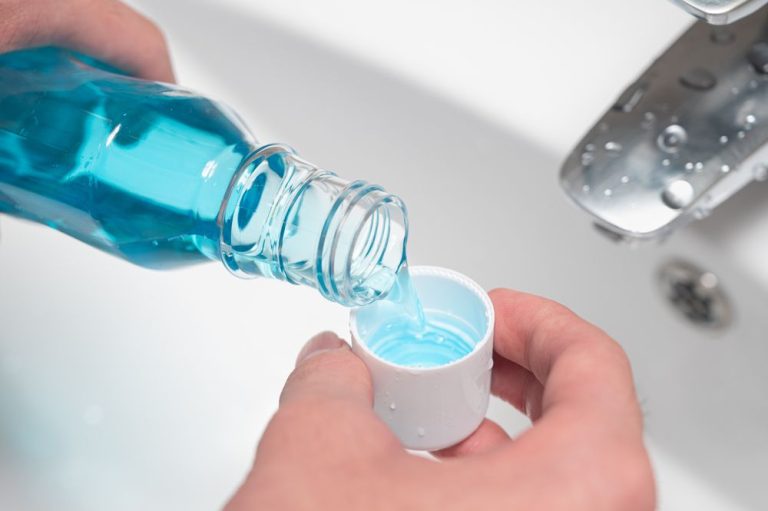Maintaining good oral health is a multifaceted approach beyond brushing and flossing. In general, restorative, and cosmetic dentistry, mouthwash plays a vital role in complementing regular oral hygiene practices. As a powerful adjunct to brushing and flossing, mouthwash effectively kills bacteria, prevents gingivitis, and strengthens tooth enamel, reducing the risk of oral infections and diseases. By incorporating mouthwash into their daily routine, individuals can significantly enhance their oral health, reduce the need for restorative treatments, and maintain the longevity of cosmetic enhancements.
This article explores the importance of mouthwash in general, restorative, and cosmetic dentistry, highlighting its benefits, types, and proper usage.
Understanding mouthwashes
Mouthwash is a liquid solution designed to rinse and clean the mouth, teeth, and gums, providing a comprehensive oral hygiene experience. Typically swished around the mouth for 30 seconds to 1 minute before being spat out, mouthwash serves as a supplemental tool to brushing and flossing. Its primary functions include reducing plaque, preventing gingivitis, strengthening tooth enamel, freshening breath, and whitening teeth.
History of mouthwash
Mouthwash has been used for centuries, dating back to ancient civilizations. The earliest recorded use of mouthwash was in ancient China, where people used saltwater to rinse their mouths. In the 19th century, mouthwash became more widespread, with the introduction of commercial products.
Types of mouthwash
- Fluoride Mouthwash: Strengthens tooth enamel and prevents decay.
- Antibacterial Mouthwash: Kills bacteria and prevents oral infections.
- Antifungal Mouthwash: Treats fungal infections, such as oral thrush.
- Natural Mouthwash: Contains herbal ingredients, such as essential oils.
- Whitening Mouthwash: Contains mild abrasives for surface stain removal.
What is the importance of mouthwash for oral health?
Mouthwash plays a crucial role in maintaining good oral health. Here are some key importance of mouthwash:
Prevents Oral Infections
- Reduces bacteria and viruses
- Prevents gum disease (gingivitis)
- Fights fungal infections (oral thrush)
Maintains Healthy Gums
- Reduces inflammation
- Prevents gum recession
- Promotes healthy gum attachment
Strengthens Teeth
- Fluoride mouthwashes strengthen tooth enamel
- Prevents tooth decay
- Reduces sensitivity
Freshens Breath
- Kills bacteria causing bad breath
- Leaves mouth feeling clean and fresh
Additional Benefits
- Whitens teeth
- Reduces plaque
- Helps prevent oral cancer
- Soothes mouth sores
- Helps manage dry mouth
How to choose the right mouthwash?
Choosing the right mouthwash depends on your oral health needs and preferences. Here’s a step-by-step guide:
Step 1: Determine Your Oral Health Needs
- Gum disease or sensitivity: Look for antibacterial or anti-inflammatory mouthwashes.
- Tooth decay: Choose fluoride mouthwashes.
- Bad breath: Select mouthwashes with antibacterial or odor-fighting ingredients.
- Whitening: Opt for mouthwashes with mild abrasives or hydrogen peroxide.
- Dry mouth: Consider mouthwashes with moisturizing ingredients.
Step 2: Consider Your Health Status
- Pregnancy or breastfeeding: Choose mouthwashes with natural ingredients.
- Diabetes or oral health conditions: Consult your dentist or healthcare provider.
- Allergies or sensitivities: Opt for hypoallergenic mouthwashes.
Step 3: Check the Ingredients
- Active ingredients: Chlorhexidine, fluoride, or essential oils.
- pH level: Neutral or slightly alkaline (pH 6.5-7.5).
- Artificial colors or flavors: Avoid if sensitive.
Step 4: Choose a Mouthwash Type
- Antibacterial
- Fluoride
- Antifungal
- Anti-plaque
- Whitening
- Natural
- Sensitivity
Step 5: Look for Certifications
- American Dental Association (ADA) Seal of Acceptance.
- International Organization for Standardization (ISO) certification.
Step 6: Read Reviews and Consult Your Dentist
- Check online reviews from trusted sources.
- Consult your dentist or healthcare provider for recommendations.
How do you incorporate mouthwash into your oral hygiene routine?
You must ensure to incorporate mouthwashes into your oral hygiene routine:
- Use mouthwash twice a day: After brushing and flossing.
- Swish for 30 seconds: Allow mouthwash to contact all areas.
- Do not swallow: Spit out mouthwash.
- Combine with brushing and flossing: For optimal oral health.
Mouthwash is a vital component of a comprehensive oral hygiene routine, providing numerous benefits for maintaining healthy teeth, gums, and overall oral well-being. By incorporating mouthwash into daily oral care, individuals can effectively prevent oral infections, strengthen tooth enamel, freshen breath, and promote healthy gums.


Comments are closed.